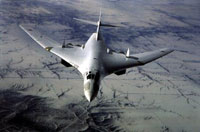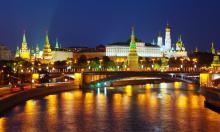USA, Britain and Canada Tear Their Hair Out About Russian Bombers
Russia’s long-distance aviation has reminded the world of its existence again. Two Tu-95 strategic bombers patrolled the Arctic Ocean and the water area of the Pacific Ocean in the beginning of September.

It goes without saying that such long-distance flights attract other countries’ attention immediately. Two F-15 fighters of the US Air Force were accompanying the Russian bombers during the recent flight.
Russian official said that all flights of the Russian aviation were performed in strict accordance with international rules for the use of air space above neutral waters.
Russia resumed the flights of its strategic bombers in August 2007 after a break of 15 years. The flights were resumed to designate Russia’s constant presence in strategically important regions of the globe.
Russian bombers do not carry any bombs aboard during such flights. However, the USA, Britain and Canada do not miss a chance to cause a commotion about the flights of the Russian aviation. It seems that such a country as Russia, which has strategic aviation in the arsenal, does not have a right to use it just because the United States, Canada and Britain set out their concerns at this point.
"If Russia feels as though they want to take some of these old aircraft out of mothballs and get them flying again, that's their decision," then-State Department spokesman Sean McCormack said in 2007.
It was clear that the United States was not happy about such a decision of Russia.
The flights of Russian bombers to the North Pole continue the nation’s course to establish its rights on the natural riches of the Arctic shelf. The Russian bombers also patrol southern territories of the planet – above the Pacific, the Indian and the Atlantic Oceans. Two Tu-160 planes landed in Venezuela in September of 2008.
The Washington Post wrote that the Russian bombers had landed in Venezuela to torture Washington. It became the first occurrence, when such potential dangerous Russian planes landed in the Western hemisphere since the end of the Cold War era, the newspaper wrote.
"Russia is a state that is unfortunately using the one tool that it has always used whenever it wishes to deliver a message and that's its military power. That's not the way to deal in the 21st century," then-US Secretary of State Condoleezza Rice told reporters back then.
Russia ’s then-Air Force Commander, Pyotr Deinekin, responded to Ms. Rice’s irony.
“As a person, who, being a pilot, participated in the state tests of the Tu-160 bomber, I can say that it is a state-of-the-art combat aircraft which constantly develops from the point of view ofits high-precision weapons, including air bombs and cruise missiles. Nuclear cruise missiles – one Tu-160 takes 12 such missiles – fly to their targets at low altitudes. There is no anti-aircraft system in the world that could replace such missiles. This is their qualitative difference from intercontinental ballistic missiles, the launch of which can be easily traced from space,” the official said.
Canada was also concerned about the flight of the Russian Tu-95 bomber near the Canadian border in the Arctic in February of this year.
“I've expressed at various times the deep concern our government has with increasingly aggressive Russian actions around the globe and Russian intrusions into our airspace. This government has responded every time the Russians have done that. We will continue to respond. We will defend our airspace,"
Canadian Prime Minister Stephen Harper said.
The bomber was flying above the neutral waters and did not even intend to cross the nation’s air border. Moreover, the Canadian government had been notified of the flight.
The House of Commons of the British Parliament prepared a report in July of this year titled “Russia: A New Confrontation?” The deputies of the parliament urged the government of the nation to show a tougher reaction to the flights of Russian warplanes near the British airspace. The deputies said that the flights could only escalate tension in the region.
The British do not like it that the Russian warplanes have approached the British airspace 18 times during the recent 2.5 years and did not inform Britain of the intentions.
“None of the bombers — ten flights in 2007, six in 2008 and two this year — had entered British airspace. But they had flown into the “UK flight information region” - just outside territorial airspace - “without authorisation”. All countries are required to communicate that they are making such flights under the International Civil Aviation Organisation (ICAO) regulations to which Russia is a signatory,” The Times wrote on July 10, 2009.
“These aircraft cut across some of the busiest air routes in the world... and risk leading to serious accidents. Russia should not be making such flights without informing the appropriate authorities,” the Commons Defence Committee said.
The respectable MPs seem to have forgotten that the rules of the civil aviation do not expand to warplanes.
It just so happens that the United States, Canada and Britain are very unhappy about Russia’s return to the club of military superpowers.
Vladimir Anokhin
Also read: Strategic aviation back on patrol
Subscribe to Pravda.Ru Telegram channel, Facebook, RSS!



